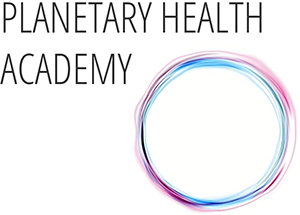- with Prof. Dr. Ilona Otto (University of Graz), Prof. Dr. Timothy Lenton (University of Exeter), Dr. Nick Watts (National Health Service) and Dr. Martin Herrmann (KLUG)
The concept of social tipping interventions plays an increasing role within the climate science and movement. Prof. Dr. Ilona Otto published a first article on “Social tipping dynamics for stabilizing Earth’s climate by 2050” in early 2020, which has developed an enormous reach and was further developed and brought into practice by others such as Prof. Dr. Timothy Lenton or Dr. Nick Watts. The work on social tipping interventions deeply influenced the development of the German Climate Change and Health Alliance (KLUG) and lead to a steady exchange of ideas including a keynote lecture from Ilona Otto during the very first Planetary Health Academy lecture series.
Celebrating KLUG´s 5th anniversary we are now giving ourselves a series of events on the theory and practice of social tipping interventions in order to sharpen our understanding and practice and make the concept more communicable.
We recommend reading the articles by Ilona Otto and Timothy Lenton or watching introductory talks to prepare for the events.
About our guests:
Prof. Dr. Ilona M. Otto, Wegener Center for Climate and Global Change, University of Graz
Prof. Dr. Ilona Otto leads a research group focusing on Social Impacts of Climate Change, Social Complexity and System Transformation. The group uses novel theoretical approaches and research methods to analyze social dynamic processes that can radically reshape interactions of human societies with nature and ecosystem services over the next 30 years.
Drawing on an expert survey, an expert workshop and a thorough literature review, the social tipping interventions explored and proposed by Ilona Otto et al. comprise the removal of fossil-fuels subsidies while incentivizing distributed energy generation; the construction of carbon-neutral cities; divestments from assets linked to fossil fuels; the exposure of the moral implications of fossil fuels; much improved climate education and engagement; and greenhouse gas emissions information disclosure.
“From the energy sector to financial markets to our cities – we were able to pin down social tipping elements and identify concrete interventions that might activate contagious processes of rapidly spreading technologies, behavioral patterns and social norms.”
Prof. Dr. Timothy Lenton, Director of the Global Systems Institute, University of Exeter
Prof. Dr. Timothy Lenton´s research focuses on understanding the behavior of the Earth as a whole system, the complex web of biological, geochemical and physical processes that shape the chemical composition of the atmosphere and oceans, as well as the climate of the Earth. He is particularly interested in how life has reshaped the planet in the past and what lessons we can draw from this as we proceed to reshape the planet now. His work identifying tipping points in the climate system has led him on to examine positive tipping points within our social systems which could help accelerate progress towards a sustainable future.
“Just as Tipping Points are part of the greatest threat we face – the same logic may also provide the solution. At the University of Exeter, we have identified a variety of Positive Tipping Points in human societies that can propel rapid decarbonisation. This concept could unlock the stalemate – the sense that there’s nothing we can do about climate change.“
Dr. Nick Watts, National Health Service (NHS)
Dr. Nick Watts is the Chief Sustainability Officer of the NHS, responsible for its commitment to deliver a world-class net zero emission health service. Based in London, he leads the Greener NHS team across the country, which focuses on improving the health of patients and the public through a robust and accelerated response to climate change and the broader sustainability agenda.
Nick is a medical doctor licensed in Australia and the UK, and has trained population health and public policy. He is a Member by Distinction of the Royal College of Physicians’ Faculty of Public Health, and an Honorary Associate Professor of University College London’s Institute for Global Health.
Prior to the National Health Service, Nick worked internationally as the Executive Director of the Lancet Countdown and the Lancet Commission on Health and Climate Change, a collaboration of UN agencies and academic centres across the world. He has also focused on engaging the health profession on the links between public health and climate change, having founded both the Global Climate and Health Alliance and the UK Health Alliance on Climate Change.
“The climate crisis is a health emergency, it’s that simple. More than 13 million deaths around the world each year are due to avoidable environmental causes.”
Dr. Martin Herrmann (German Climate Change and Health Alliance, KLUG)
Dr. Martin Herrmann, the co-founder and chairman of KLUG, has been professionally accompanying transformation processes for many years. Originally a doctor, Martin Herrmann soon shifted to advising companies and NGOs. He developed new methods for organisational development and teaches at international universities and colleges. His current focus of work includes: education for transformative action, methodological innovations based on the “Social Tipping Dynamics” concept, initiation of “unlikely” networks and alliances and health-related heat protection. He has been a member of the German Medical Association’s working group on climate and health since 2019 and is co-founder of the Aktionsbündnis Hitzeschutz Berlin. He is especially passionate about linking complexity science and Hannah Arendt’s political philosophy to the transformational challenges of our time.
“We humans are talented to act in the face of the planetary health emergency. The perspective of social tipping interventions gives us a conceptual frame, it allows us to initiate and implement the deep changes that are needed in all sectors and all regions.”
